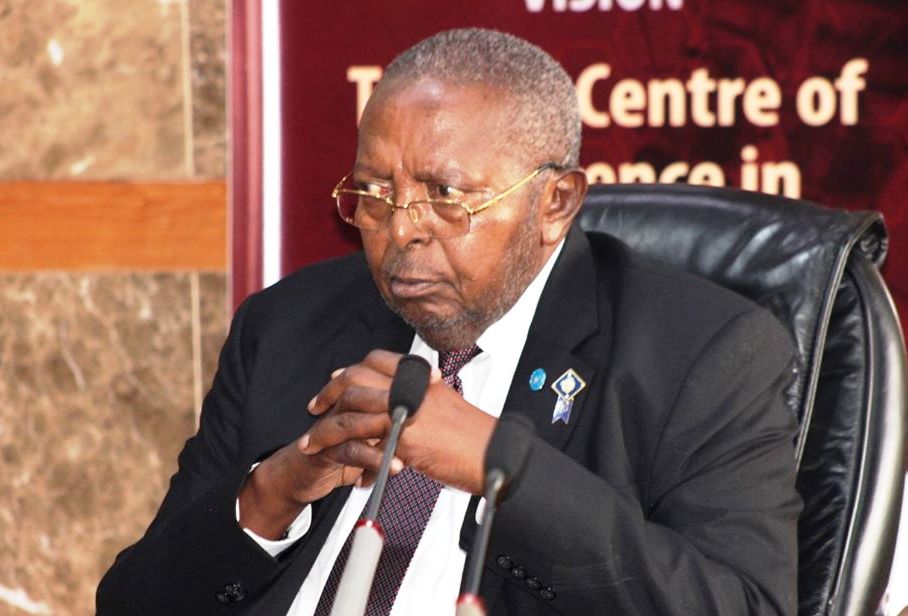Stanbic Bank Uganda officials led by the bank’s Chief Executive, Anne Juuko (with microphone) joined the rest of Standard Group’s subsidiaries across Africa to celebrate the 160 years of the bank’s existence
Stanbic Bank Uganda on Friday treated its loyal customers to locally grown and brewed coffee as the financial institution joined its parent company, Standard Bank Group to celebrate 160 years of impacting lives across Africa.
The bank’s milestone coincides with Uganda’s 60th independence anniversary and to celebrate the country’s heritage, Stanbic bank not only served its customers unique Uganda Arabica and Robusta coffees, but also carried out a coffee cupping session in which the bank’s staff and customers tasted the aroma and uniqueness of Uganda coffees.
Each table had a coffee ‘taster/cupper’.
Stanbic partnered with Aramah coffee, the flagship brand of Mara Agribusiness, to serve the coffee.
Globally, coffee tasting/cupping is a growing profession as people increasingly drink the popular beverage.
Cupping coffee refers to how coffee producers and buyers taste coffee to check a batch for quality control.
During coffee cupping, tasters score coffee on various aspects, such as cleanness, acidity, sweetness, mouthfeel and aftertaste.
Speaking at the event held at Serena Hotel in Kampala, Japheth Katto, the Board Chairman of Stanbic Uganda Holdings Ltd (SUHL), the parent company of Stanbic Bank Uganda, said that true independence doesn’t lie in celebrations, but in the country’s ability to fund its own budget with revenues mobilized through its domestic resources.
He noted that coffee has been an important cash crop for Uganda’s economy for many decades and remains the country’s top earning agricultural export.
According to BoU figures, Uganda earned US$718.96m (UShs2.74 trillion) in 2021 from coffee exports, up from US$515.53m (UShs1.96 trillion) recorded in 2020.
The figures show that 6.77m 60kg bags of coffee were exported in2021, up from 5.49m bags in 2020.
“This is important for Uganda’s fiscal independence,” Katto said, explaining why the bank chose the theme of coffee in celebrating its 160 years of impacting lives and 60 years of Uganda’s independence.
“Stanbic Bank Uganda has for decades supported Uganda’s agricultural sector including financing many coffee farmers who produce nearly 10m bags of coffee every year. Therefore, in making these two milestones (160 years of Standard Bank Group and 60 years of Uganda’s independence), we teamed up with Ugandan young coffee farmers to have coffee tasting experience as part of our celebrations,” Katto explained.

He further revealed that many Ugandans including himself are who they are because of money their parents earned from coffee.
He also explained how Robusta coffee dry cherries came to be known as kiboko.
“Before independence, the colonial agricultural officers used to tour smallholder coffee farmers to check that the bushes/weeds in coffee were well weeded and maintained. Those farmers who were reluctant in looking after their coffee were whipped (given kiboko, a Luganda word for whipping/caning). This practice endured for several years but after independence things changed. Robusta coffee which was the most commonly grown became known as kiboko coffee because those who couldn’t look after their gardens/farms properly were given a whipping/ kiboko.” Katto explained the history of kiboko coffee.
He revealed that although Arabica coffee was introduced in Uganda from Ethiopia around 1900, Robusta has always been a native coffee variety for Uganda.
He said the first coffee plantation was established in 1914.
“The authorities encouraged locals to grow Robusta because it did well in low lands of the central region (and other parts of Uganda) in contrast to Arabica which thrives in highlands,” he said, adding that by 1925, coffee made 1% of Uganda’s exports.
Robusta makes 80% of Uganda’s coffee production, while Arabica covers 20%.
Currently, coffee contributes an average of 30% to the national economy.
Damoni Kitabire, a Director at Stanbic Bank, who was the ‘chief cupper/taster’, described all the coffees he tasted as “great.”
“We had Arabica the dark roast, Arabica medium roast, Robusta medium roast and Aramah the blend. All the coffees are great, the aroma is fantastic but Arabica dark roast hit me most,” he said.
BoU Commends Stanbic
Speaking at the same event, Dr. Twinemanzi Tumubweine, the Executive Director for Supervision at BoU, said that the growth trajectory of Stanbic Bank suggests that this is just the beginning of a much longer journey.
He applauded Stanbic of spearheading a number of thought leadership initiatives.
“Despite their size, Stanbic Bank has many firsts. Every month when we have our meetings as BoU with CEOs of commercial banks, we always give an award for the best primary dealers. To-date when we started giving out this award about four years ago, Stanbic has a record of having won it six consecutive times,” Tumubweine said, adding that Stanbic is also the first bank to apply and get an e-wallet license.
He added that Stanbic is the first bank in Uganda to cross US$1bn in loans to customers. Stanbic Bank’s loans advanced to customers grew by 3.05% to Shs3.72 trillion in 2021, up from Shs3.61 trillion recorded the previous year.
He revealed that the Central Bank takes into account Stanbic Bank’s Purchasing Managers’ Index when planning the monetary policy.
“So far, Stanbic bank is the only one whose prime lending rate is highly and positively correlated with the CBR (Central Bank Rate). What other banks do and I am not saying it in bad faith, it’s not their fault, is that they tend to demonstrate downward sickness; when the CBR goes up, their prime rate goes up and when the CBR comes down, they have hesitation to reduce their prime lending rates,” he said.
He said the 160 years of Standard Bank Group in Africa is important but urged Stanbic not to get conformable.
The Stanbic Bank Uganda Chief Executive, Anne Juuko, said it’s a privilege for her to be captaining the Bank at such a critical moment.
She applauded the previous CEOs and staff that have played a key role in the growth of Standard Bank Group that was born in South Africa in 1862. The Bank operates in 20 countries across Africa
“Standard Bank has provided employment to over 50,000 staff members directly and many more thousands indirectly across the continent, but more importantly, it has impacted and touched millions of lives across the continent,” she said.
She added: “Standard Bank is special because it has flown the same flag; the same flag you see has been flown for the last 160 years. We have never changed the logo. We may change names, we may change locations, but the values on which we were founded remain the same. We are so privileged and honored to serve you on the same values. Our motto from the beginning has been ‘let the standards go forward’. We still serve on those very same principles on which we go forward.”
Juuko said the bank is supporting 15 million customers across the continent.
She added that the bank is reaffirming its commitment to communities in which it serves.
“We have donated in billions to maternal health sector, to the education sector, to the agricultural sector and increasingly, we will continue to do that up to the end of this month. We are giving back to the community that has supported us so much over the last 160 years,” Juuko said.






